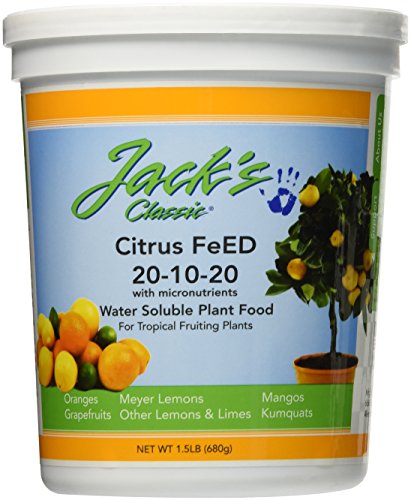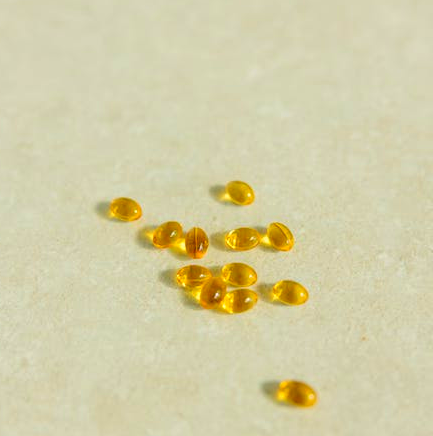Table of Contents
Citrus trees are popular among homeowners for their refreshing aroma, bountiful fruits, and vibrant foliage. Native to various warm regions across the globe, these trees can be grown in a variety of climates as long as they receive the right care. One crucial aspect of their care is choosing the right fertilizer.
The best citrus tree fertilizer should be rich in nitrogen, essential for leaf growth, but also contain other vital nutrients such as phosphorus, which promotes flower and fruit production, and potassium, which enhances plant immunity. Fertilizers made specifically for citrus trees often include micro-nutrients that help maintain overall tree health. The wrong fertilizer can lead to malnourishment, poor growth, and low fruit production.
When selecting a fertilizer for your citrus trees, it’s important to pay attention to the nutrient ratios. A good citrus fertilizer typically contains a balanced mix of macro and micro-nutrients. Commonly, you’ll find the fertilizers labeled with a formulation, for example, 12-6-4. This means the fertilizer contains 12% nitrogen, 6% phosphorus and 4% potassium.
Throughout this article, we aim to guide you on your journey of choosing the best fertilizer for your cherished citrus trees. We have extensively researched, utilized numerous different ones, and evaluated their impact on our trees’ health, vitality, and yield. By the end of this read, you will have all the knowledge you need to pick a fertilizer that keeps your citrus trees vibrant, fruitful, and robust.
Best Citrus Tree Fertilizer
Finding the ideal fertilizer for your citrus trees is vital to their health and ensuring they produce a hearty crop of fruit. The fertilizer needs to be rich in nitrogen for promoting leaf growth and should also contain the right balance of other nutrients. With a broad array of choices out there, it can be daunting to pinpoint the best one for your tree. In this article, we have curated a list of the best citrus tree fertilizers that we have tested and found to be quite beneficial. Our insightful findings will guide you in your quest for the healthiest and most fruitful citrus tree possible.
Jacks Classic Citrus Feed 20-10-20 Water-Soluble Plant Food with Micronutrients, 1.5lb

If you’re looking for a reliable citrus fertilizer, Jacks Classic Citrus Feed is a great option to consider.
Pros
- This fertilizer is specifically formulated to enhance the color and increase the size of citrus fruits.
- It is easy to use and mixes well in water.
- Jacks Classic Citrus Feed is designed to provide a high level of potassium, which is essential for strong stems and healthy flowers.
Cons
- This fertilizer may not be suitable for all types of citrus trees.
- It may not be as effective for trees that are already in peak production.
- Some users may find the smell of this fertilizer to be unpleasant.
We have used Jacks Classic Citrus Feed for our orange and lemon trees, and we have seen a noticeable improvement in the size and color of the fruits. The fertilizer is easy to use, and we simply mix it with water and water our trees as usual. We have also noticed that our trees have become more robust and have developed stronger stems.
One thing to keep in mind is that this fertilizer may not be suitable for all types of citrus trees. It is specifically formulated for orange and lemon trees, so if you have a different type of citrus tree, you may want to consider a different fertilizer. Additionally, this fertilizer may not be as effective for trees that are already in peak production.
Overall, we would recommend Jacks Classic Citrus Feed to anyone looking for a reliable citrus fertilizer. It is easy to use, provides a high level of potassium, and has helped us to achieve larger and more vibrant fruits on our orange and lemon trees.
Jobe’s Organics 09226NA Granular Plant Food Fruit & Citrus, 4lbs, Brown

If you’re looking for an organic fertilizer for your citrus trees, Jobe’s Organics 09226NA Granular Plant Food Fruit & Citrus is a great option.
Pros
- Contains a complete analysis of nitrogen, phosphorus, and potassium (NPK) for healthy plant growth.
- Formulated to provide balanced feeding for optimal fruit development.
- Organic and safe for the environment.
Cons
- May require multiple applications for optimal results.
- Some users may find the recommended application rate too low.
- May not be suitable for all types of citrus trees.
We’ve used Jobe’s Organics 09226NA Granular Plant Food Fruit & Citrus for our orange tree, and we’ve been pleased with the results. The product contains a complete analysis of nitrogen, phosphorus, and potassium (NPK), which is essential for healthy plant growth. The formulation is also designed to provide balanced feeding for optimal fruit development, which has been evident in our tree.
One of the benefits of using Jobe’s Organics 09226NA Granular Plant Food Fruit & Citrus is that it’s organic and safe for the environment. Unlike synthetic fertilizers, this product won’t harm beneficial soil organisms or contaminate groundwater. It’s also easy to apply, and the granules can be worked into the soil around the base of the tree.
However, we did find that we needed to apply the product multiple times to see optimal results. The recommended application rate is 1 to 2 pounds per 100 square feet, which may not be enough for some trees. Additionally, some users may find the recommended application rate too low for their needs.
Overall, we would recommend Jobe’s Organics 09226NA Granular Plant Food Fruit & Citrus to anyone looking for an organic fertilizer for their citrus trees. It’s effective, easy to apply, and safe for the environment.
Jobe’s, 04226 Fertilizer Spikes, Fruit and Citrus, 6 Count, Slow Release, Apple, Orange, Lemon, Trees

If you’re looking for a simple and effective way to fertilize your fruit trees, Jobe’s Fertilizer Spikes might be just what you need.
Pros
- The slow-release formula provides a steady supply of nutrients to your trees for up to 3 months.
- The spikes are designed to be easy to push into the soil around the base of your tree, with no need for mixing or measuring.
- The spikes are safe to use around children and pets once they’re watered in.
Cons
- The spikes are designed for use with fruit trees only, so they might not be suitable for other types of trees.
- The product only comes with 6 spikes, which might not be enough to fertilize all of your trees.
- The spikes might not be suitable for use with larger trees, as they’re designed for use with younger trees.
We’ve used Jobe’s Fertilizer Spikes on our apple, orange, and lemon trees, and we’ve been pleased with the results. The spikes are easy to use, and we appreciate that they provide a steady supply of nutrients to our trees over a period of several months.
One thing to keep in mind is that the spikes are designed for use with younger trees. If you have larger trees, you might need to use more than one spike per tree, or you might need to use a different type of fertilizer.
Overall, we would recommend Jobe’s Fertilizer Spikes to anyone looking for an easy and effective way to fertilize their fruit trees.
Miracle-Gro Fruit & Citrus Plant Food Spikes

If you’re looking for a convenient way to feed your citrus trees, the Miracle-Gro Fruit & Citrus Plant Food Spikes might be just what you need.
Pros
- The spikes are pre-planted with a slow-release granule plant food that provides essential nutrients for healthy growth and fruit production.
- They are designed to be used with Miracle-Gro Citrus, Avocado & Subtropical Plant Food, which is specially formulated for these types of plants.
- The spikes are easy to use – simply push them into the soil around your tree.
Cons
- The spikes only provide nutrition for up to 3 months, so you’ll need to reapply them regularly.
- They are only suitable for use with Miracle-Gro Citrus, Avocado & Subtropical Plant Food, so if you’re using a different type of fertilizer, they won’t work.
- The spikes are relatively expensive compared to other fertilizer options.
We’ve used the Miracle-Gro Fruit & Citrus Plant Food Spikes on our citrus trees, and we’ve found them to be a convenient and easy way to provide our plants with the nutrients they need. The spikes are pre-planted with a slow-release granule plant food that provides essential nutrients for healthy growth and fruit production, so we don’t have to worry about remembering to feed our trees on a regular basis.
One thing to keep in mind is that the spikes only provide nutrition for up to 3 months, so we’ll need to reapply them regularly to keep our trees healthy. Additionally, the spikes are only suitable for use with Miracle-Gro Citrus, Avocado & Subtropical Plant Food, so if we’re using a different type of fertilizer, they won’t work. Finally, the spikes are relatively expensive compared to other fertilizer options, so they may not be the best choice for those on a tight budget.
Overall, if you’re looking for a convenient and easy way to feed your citrus trees, the Miracle-Gro Fruit & Citrus Plant Food Spikes are a solid choice. Just keep in mind that they’ll need to be reapplied regularly and they are relatively expensive.
Citrus Fertilizer for All Citrus and Fruiting Trees, Liquid Plant Food 8 oz (250mL)

If you’re looking for a fertilizer that can help your citrus and fruiting trees grow healthy and strong, the Citrus Fertilizer for All Citrus and Fruiting Trees by Safer Brand might be the perfect solution for you.
Pros
- Provides a rich source of nutrients for optimal growth and flowering
- Helps build strong roots for healthy trees
- Contains no nitrogen to prevent foliage burn on citrus
Cons
- Might not be suitable for all types of trees
- Some users might find the application process a bit messy
- The price might be a bit high for some users
We’ve used this fertilizer for our citrus and fruiting trees, and we’ve found that it provides a rich source of nutrients that helps our trees grow healthy and strong. The formula is designed to promote optimal growth and flowering, which means that you can expect to see some great results in no time.
One of the things that we really like about this fertilizer is that it helps build strong roots for healthy trees. This is especially important for citrus and fruiting trees, which require a lot of nutrients and water to thrive. By using this fertilizer, you can help ensure that your trees have the right nutrients and water they need to grow strong and healthy.
Another great thing about this fertilizer is that it contains no nitrogen, which means that it won’t cause foliage burn on your citrus trees. This is a common problem with other fertilizers, which can cause the leaves on your trees to turn yellow or brown. With this fertilizer, you don’t have to worry about that.
However, it’s worth noting that this fertilizer might not be suitable for all types of trees. If you have other types of trees in your garden, you might want to consider using a different fertilizer that’s specifically designed for those types of trees.
Overall, we would definitely recommend the Citrus Fertilizer for All Citrus and Fruiting Trees by Safer Brand to anyone who’s looking for a high-quality fertilizer for their citrus and fruiting trees. It’s a bit pricey, but the results are definitely worth it.
Buying Guide
Citrus trees are a popular choice for gardeners due to their delicious fruit and beautiful foliage. However, to ensure that your citrus tree is healthy and produces an abundant harvest, it is essential to provide it with the right nutrients. Citrus tree fertilizers are specifically formulated to meet the unique needs of these trees, and choosing the right one can make a significant difference in their growth and productivity.
Nutrient Content
The nutrient content of a citrus tree fertilizer is perhaps the most critical factor to consider. Citrus trees require a balanced diet of essential nutrients, including nitrogen, phosphorus, and potassium, as well as trace minerals such as calcium, magnesium, and sulfur. A high-quality citrus tree fertilizer will provide a balanced mix of these nutrients in a form that is easily absorbed by the tree.
Slow Release vs. Quick Release
Citrus tree fertilizers are available in both slow-release and quick-release forms. Slow-release fertilizers are designed to provide a steady supply of nutrients over an extended period, while quick-release fertilizers provide a burst of nutrients all at once. Slow-release fertilizers are generally preferred for citrus trees, as they provide a more consistent supply of nutrients and reduce the risk of nutrient burn.
Organic vs. Synthetic
Citrus tree fertilizers are available in both organic and synthetic forms. Organic fertilizers are derived from natural sources such as bone meal, blood meal, and compost, while synthetic fertilizers are made from chemical compounds. Organic fertilizers are generally preferred for citrus trees, as they provide a more natural source of nutrients and are less likely to harm the environment.
Application Method
Citrus tree fertilizers are available in a variety of application methods, including granular, liquid, and slow-release forms. The application method you choose will depend on your personal preference and the needs of your citrus tree. Granular fertilizers are easy to apply and provide a slow-release of nutrients, while liquid fertilizers provide a quick-release of nutrients and are easy to mix with water. Slow-release fertilizers are designed to provide a steady supply of nutrients over an extended period and are ideal for citrus trees that require frequent feeding.
In summary, when choosing the best citrus tree fertilizer, it is essential to consider the nutrient content, slow release vs. quick release, organic vs. synthetic, and application method. By taking these factors into account, you can ensure that your citrus tree receives the right nutrients to thrive and produce an abundant harvest.
Frequently Asked Questions
What are the optimal nutrient ratios for citrus trees?
Citrus trees require a balanced diet of essential nutrients, including nitrogen, phosphorus, and potassium. The optimal nutrient ratio for citrus trees is typically considered to be a 3-1-2 ratio, which means three parts nitrogen, one part phosphorus, and two parts potassium. However, the exact ratio may vary depending on the specific needs of your citrus tree and the type of soil in which it is growing.
How often should citrus trees be fertilized?
Citrus trees typically require regular fertilization throughout the growing season to maintain optimal health and productivity. The frequency of fertilization will depend on a variety of factors, including the age and size of the tree, the type of soil in which it is growing, and the availability of natural nutrients. In general, citrus trees should be fertilized every 4-6 weeks during the growing season, with the frequency being adjusted as needed based on the tree’s response to fertilization.
What are the best organic fertilizers for citrus trees?
Organic fertilizers are a popular choice for citrus tree growers due to their natural sourcing and ability to promote healthy soil structure. Some of the best organic fertilizers for citrus trees include compost, bone meal, blood meal, and fish emulsion. These fertilizers can be applied in a variety of forms, including granular, liquid, and slow-release.
Can citrus trees benefit from the use of liquid fertilizers?
Yes, citrus trees can benefit from the use of liquid fertilizers. Liquid fertilizers are typically more easily absorbed by the tree than granular fertilizers, which can help promote rapid growth and improved overall health. However, it is important to use liquid fertilizers in moderation, as over-fertilization can lead to nutrient burn and other negative effects.
What are the most recommended citrus tree fertilizers by experts?
There are many different citrus tree fertilizers on the market, each with its own unique set of benefits and drawbacks. Some of the most recommended citrus tree fertilizers by experts include Citrus-Tone, Osmocote Citrus & Avocado, and Espoma Citrus-tone. These fertilizers are known for their ability to promote healthy growth and productivity in citrus trees, while also being easy to apply and affordable.
What are the potential risks of over-fertilizing citrus trees?
Over-fertilizing citrus trees can lead to a variety of negative effects, including nutrient burn, stunted growth, and reduced fruit production. Additionally, over-fertilization can lead to the accumulation of salts and other harmful chemicals in the soil, which can further harm the tree. It is important to follow the recommended fertilization schedule and dosage for your specific citrus tree variety to avoid these potential risks.


